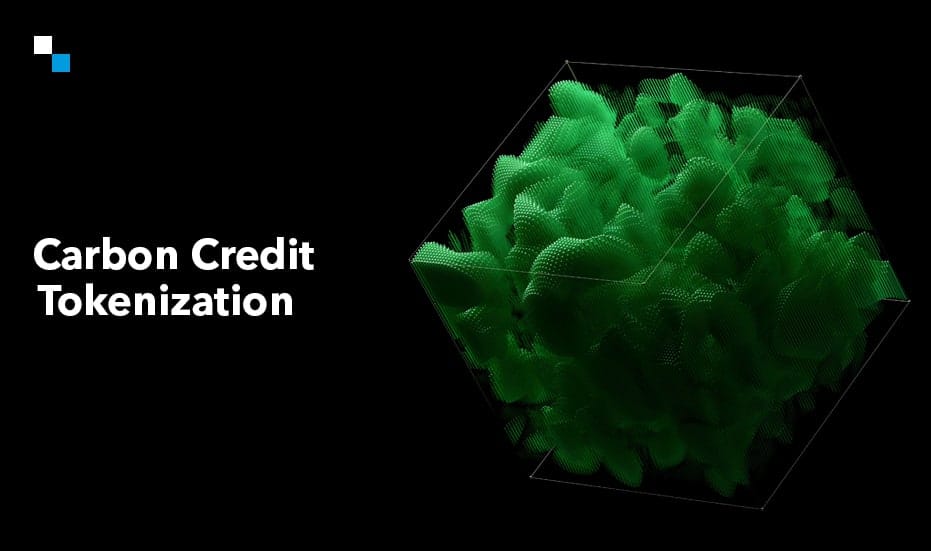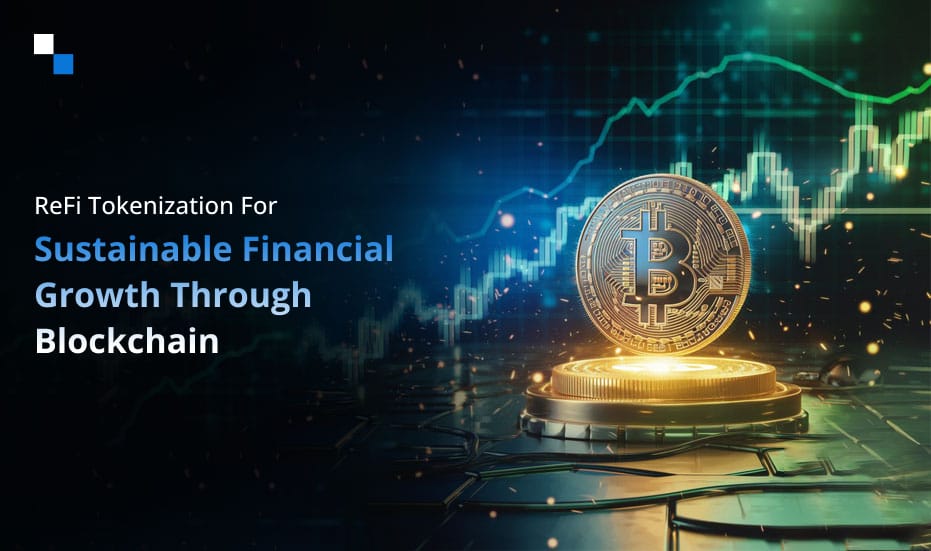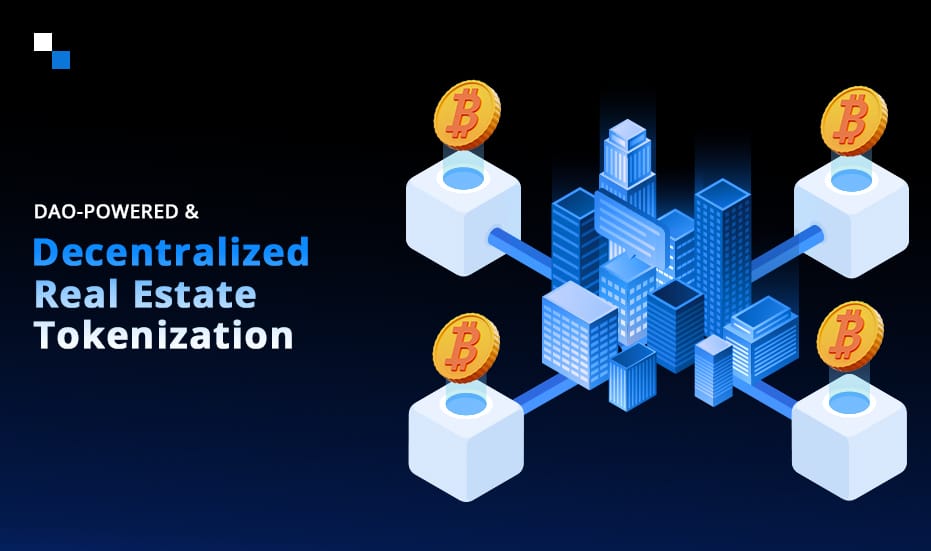
How On-Chain White Label Crypto Wallet Enables Smooth Transaction Process
October 23, 2024
What Innovations in Crypto Neo Banking Can We Anticipate from Gen-AI Beyond 2025?
October 24, 2024The global market capitalization of tokenized assets is expected to reach $16 trillion by 2030. Tokenizing real-world assets could transform various industries, including securities, real estate, art, and carbon credits. This innovation marks a significant evolution in how blockchain technology can be applied across different sectors.
As the world grapples with the increasingly urgent challenge of climate change, innovative solutions are emerging to facilitate environmental sustainability. Among these, carbon credit tokenization stands out as a promising mechanism that leverages blockchain technology to create a more transparent, efficient, and accessible carbon market. This blog delves into the intricacies of carbon credit tokenization, its operation, its benefits, and its potential impact on sustainability and climate action.
What Are Carbon Credits?
Carbon credits are tradable certificates that represent the right to emit a specific amount of carbon dioxide (CO2) or its equivalent in other greenhouse gasses. The concept is rooted in the global effort to mitigate climate change by reducing overall emissions.
How Carbon Credits Work
One carbon credit typically equates to one metric ton of CO2. Companies, governments, and organizations can earn carbon credits by investing in projects that reduce greenhouse gas emissions. These projects may include renewable energy initiatives, reforestation efforts, and energy efficiency upgrades.
The carbon market operates on a cap-and-trade system, where governments establish an overall limit on emissions and allocate carbon credits accordingly. Entities that reduce emissions below their allotted limits can sell their excess credits to those that exceed theirs, creating a financial incentive to reduce carbon footprints. This market-driven approach encourages businesses to innovate and invest in sustainable practices.
What is Carbon Credit Tokenization?
Carbon credit tokenization involves converting traditional carbon credits into digital tokens that exist on a blockchain. This innovative process enables the representation, tracking, and trading of carbon credits in a decentralized, transparent manner. Each token corresponds to a specific carbon offset, making it easier to buy, sell, and trade carbon credits without the cumbersome processes associated with traditional markets.
How Carbon Credit Tokenization Works
- Issuance of Carbon Credits: Carbon credits are generated through verified emission reduction projects. Once a project is validated by a recognized standard, such as the Verified Carbon Standard (VCS) or the Gold Standard, carbon credits are issued. This verification ensures that the credits represent real, measurable, and permanent emissions reductions.
- Tokenization Process: The issued carbon credits are then converted into digital tokens on a blockchain. Each token is uniquely linked to a specific carbon credit and contains essential metadata, such as project details, emission reduction metrics, and verification history. This information provides transparency and traceability.
- Trading on the Blockchain: Once tokenized, these carbon credits can be bought, sold, or traded on various blockchain platforms. The decentralized nature of blockchain ensures that transactions are secure and immutable, reducing the risk of fraud and double counting.
- Retirement of Tokens: After purchasing a carbon credit token and using it to offset emissions, it can be “retired” on the blockchain. This process ensures that the token cannot be used again, maintaining the integrity of the carbon market.
Benefits of Carbon Credit Tokenization
Carbon credit tokenization offers a myriad of advantages that enhance the efficiency and effectiveness of carbon markets. Here are some of the most significant benefits:
1. Transparency
One of the most compelling features of blockchain technology is its ability to provide an immutable record of transactions. This transparency is crucial for the carbon credit market, as it allows stakeholders to trace the provenance and ownership of carbon credits easily. By ensuring that every transaction is recorded, carbon credit tokenization helps to prevent double counting and fraudulent claims, thus enhancing the credibility of the market.
2. Accessibility
Tokenization democratizes access to carbon credits, enabling individuals, small businesses, and organizations to participate in the carbon market. Traditional carbon credit markets often favor larger players due to high transaction costs and complexity. By lowering these barriers, tokenization can increase liquidity and foster a more inclusive market where everyone can contribute to emission reduction efforts.
3. Efficiency
Automated processes facilitated by blockchain can streamline the trading of carbon credits, reducing administrative costs and the time required for transactions. Smart contracts, which are self-executing contracts with the terms directly written into code, can automate various aspects of the trading process, such as verifying transactions and executing trades when conditions are met.
4. Smart Contracts
The implementation of smart contracts in carbon credit tokenization allows for a more automated and trustworthy transaction process. For example, a smart contract can automatically execute a trade when a buyer meets specific criteria, such as funding a particular emission reduction project. This reduces the need for intermediaries, enhancing trust and efficiency.
5. Global Reach
Tokenization can facilitate cross-border transactions, creating a global market for carbon credits that can attract investment from various regions. This global approach helps align emission reduction efforts across countries, enabling more extensive collaboration in the fight against climate change.
Real-World Applications of Carbon Credit Tokenization
Several innovative projects around the world are harnessing the power of carbon credit tokenization, showcasing its potential in real-world applications:
1. Verra
- Role: A leading global carbon standard organization
- Tokenization Initiatives: Verra has been at the forefront of carbon credit tokenization, partnering with blockchain platforms to digitize its Verified Carbon Standard (VCS) credits. This initiative aims to increase transparency, accessibility, and liquidity in the carbon market.
2. Klima DAO
- Role: A decentralized autonomous organization (DAO) focused on climate action
- Tokenization Approach: Klima DAO purchases carbon credits and mints Klima tokens, creating a direct link between the carbon market and the crypto community. This approach incentivizes individuals and organizations to invest in carbon credits while supporting climate-positive projects.
3. Moss
- Focus: Brazilian rainforest preservation
- Approach: Moss tokenizes carbon credits generated from the conservation of the Amazon rainforest. By purchasing Moss tokens, individuals and organizations can directly support the preservation of this vital ecosystem.
4. Flow Carbon
- Focus: Climate action and investment
- Approach: Flow Carbon offers a platform for individuals and organizations to purchase and retire carbon credits. They also provide tools to track and verify the impact of these credits.
5. Celo
- Focus: Mobile-first blockchain platform
- Approach: Celo is exploring the potential of tokenizing carbon credits on its platform to make climate action more accessible and inclusive.
6. Carbon Trust
- Focus: Global climate change consultancy
- Approach: The Carbon Trust has been involved in various carbon credit tokenization projects, aiming to increase transparency and efficiency in the carbon market.

The Future of Carbon Credit Tokenization
The future of carbon credit tokenization holds significant promise for enhancing the effectiveness of carbon markets and supporting global climate goals. As awareness of climate change continues to grow and more stakeholders engage in sustainability efforts, tokenization could become a mainstream method for managing carbon credits.
Innovations to Watch
- Decentralized Finance (DeFi): The integration of DeFi with carbon credit tokenization can create new financial products, such as carbon credit-backed loans or yield farming opportunities. This will incentivize further investment in emission reduction projects and broaden participation in the carbon market.
- Integration with IoT: The Internet of Things (IoT) can provide real-time data on emissions, improving the accuracy of carbon credit generation and monitoring. By leveraging IoT devices, stakeholders can track emissions and ensure that carbon credits are tied to genuine reductions, thereby enhancing the credibility of tokenized credits.
- Collaboration Across Sectors: Partnerships between technology providers, environmental organizations, and regulatory bodies will be crucial in developing a cohesive ecosystem for carbon credit tokenization. Collaborative efforts can help establish standards and best practices, ensuring that tokenization effectively contributes to climate action.
Conclusion
Carbon credit tokenization is a new way of thinking about attacking climate change as an efficient, clear, and accessible carbon market. Using the power of blockchain, carbon credit tokenization can help pave the way to a much more sustainable future and support diverse stakeholders in efforts towards fighting climate change.
Carbon credit tokenization shall prove to be a great pioneering solution for tackling environmental challenges during an opportune time that grows along with economic thinking. Whichever your profile is-as a business leader looking forward to neutralizing emissions, an investor interested in various sustainable opportunities, or just an advocate for stewardship from an environmental point of view-the time to engage with carbon credit tokenization is now.



